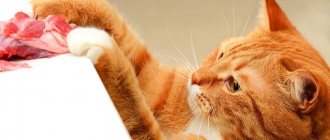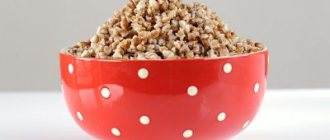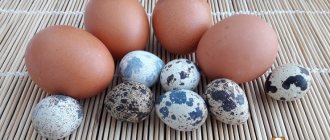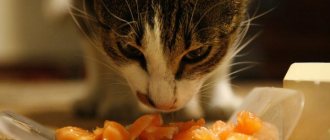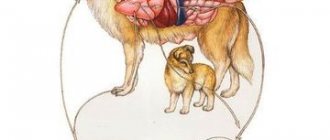Almost all cats love fish. Many of them, living in coastal regions, constantly eat seafood and feel great. There are even fishing cats from Southeast Asia and jungle cats that swim well and get their own food. However, our indoor pets are descendants of the steppe cat, which does not consume fish. Despite this, many of them receive fish as their main diet. Is it correct? Should fish be the mainstay of a cat's diet? If yes, which one? If not, what should you feed the animal instead of fish? And are there any restrictions regarding breeds? For example, can British and Scottish cats eat fish? You will get answers to these questions in the article.
This article is part of the Natural Cat Nutrition section.
The benefits of fish for cats
It is now fashionable to say that cats are absolutely not allowed to fish. But many continue to give it to their pet, rightly believing that thousands of cats have happily lived long lives on a fish diet. And it’s fair to say that such food has a number of advantages.
Complete set of amino acids
Fish is a complete protein of animal origin. It is easily digested in the short intestines of cats and contains essential amino acids, including taurine. Depending on the type of fish, the amount of protein is 16-24%, and it is absorbed by 95-98%, in contrast to meat protein - 87-90%.
Source of Omega-3 Fatty Acids
Unlike humans, it is not lean fish that is healthier for a cat, but fatty fish. In river fish (ruff, perch, pike) the fat content does not exceed 4%, the same amount in pollock, cod, and flounder. Noble varieties of fish contain 9-25% fat: herring, salmon, mackerel, sturgeon. Fat serves as a valuable source of energy and essential Omega-3 acids. Unsaturated fatty acids ensure healthy skin and coat, help reduce inflammation in the joints, and are necessary for the normal functioning of the heart and kidneys. If the cat does not get enough omega-3 acids from food, it is recommended to administer them in the form of dietary supplements (fish oil).
Thus, with fatty fish, the cat receives high-quality protein and the optimal amount of “good” fat. Claims that fish is not a species-specific food for cats are unsubstantiated. In the same way, it is not natural to feed your pet beef or chicken, because in nature a cat would eat a mouse or small bird whole, with head, skin, entrails and bones.
And what should I do with this fish?
Attractive taste and aroma
Many cats love the smell of fish and seafood. You can easily add vegetables to your pet’s food by grinding them together with fish, and even feed the tablet. Using fish juice, they flavor the water, stimulating the cat to drink more - this is necessary for diseases of the urinary system.
Even a small amount of fish in industrial food can make the product attractive to cats - this property has been successfully used, for example, in the production of “unpalatable” food for cats with kidney failure (Renal).
Fish...murrr
In other words, fish is a good way to pamper your cat, diversify the menu, and even encourage desirable behavior (training). But fish can bring not benefits, but great harm to health, if fed incorrectly.
Milk, dairy products, eggs
Dairy products are very important and must be present in your pet’s diet. A kitten, pregnant or lactating cat should be regularly treated to cottage cheese, yogurt, fermented baked milk, but there are nuances here too. Many experts recommend eliminating whole milk from your cat's diet because there is a risk that your cat may be lactose intolerant. If your cat drinks milk without consequences (constipation, diarrhea), then there is no need to exclude it from the diet.
Cats should be given:
- Homemade calcined cottage cheese.
- Homemade yogurt without additives.
- Ryazhenka.
- Yogurt.
- Serum.
Why homemade and not store-bought? The answer is obvious - most store-bought products are made from dry milk powder and starch. Conclusions about the balance of benefit and harm can be made even intuitively.
Many cats love hard cheese, but it should be given with caution. Almost all hard cheeses contain salt, and as you remember, it leads to the development of diseases of the genitourinary system and urolithiasis
The following are prohibited:
- Homemade and store-bought cream.
- Any sour cream, although some cats love it very much.
- Butter.
Eggs are considered an allergenic and very controversial product. According to expert recommendations, a cat can have no more than 1 egg at a time and no more than 1-2 times a week. It is recommended to exclude raw protein completely, but the yolk can be raw or boiled. It is recommended to give quail eggs rather than chicken eggs to cats with a sensitive digestive system.
What kind of fish is best to give to cats?
Let’s make a reservation right away - you should choose fish not for reasons of cheapness, but based on what kind of fish will benefit the cat.
Cats should not be given:
- Freshwater fish varieties (carp, roach, bream, crucian carp).
Cannot be fed raw due to the high content of antivitamins and deworming. And even when boiled, it is impossible to get rid of many small bones that are dangerous for your pet. The meat is too lean, there is not enough of it, and the labor costs for such food are not worth it - it is easier to give a piece of chicken.
Small fish caught with a fishing rod are not the best treat
- Sea fish that accumulate histamine and mercury (tuna, mackerel, herring).
The most useful varieties include fish from the salmon family:
- river trout (lives only in clean water, quite fatty, rarely infected with parasites);
- salmon, pink salmon, chum salmon.
If you need a diet with a low amount of fat, then you can give boiled lean fish - hake, cod, blue whiting.
Trout is a good choice
Which fish is prohibited?
- It is worth noting that all lake and river fish can pose a potential threat to your pet. Ordinary stray cats may be an exception. Ant. There are no problems eating such a product, however, for a pet, the best way to cut the fish is as possible. All bones must be removed.
- Even fairly large carp and pike can pose a danger to any animal. Such fish also contains a large number of small bones. It is immediately not recommended to feed your cat saury, sprat, capelin, pollock and blue whiting. They lack any benefits, and pollock most often contains worms.
- If you don’t have the opportunity to pamper your pet with noble-looking fish, then why not do it at all? It is enough to give vitamins to the animal in the form of nebula-3 and 6 acids. Consult a consultant at a pet store.
If you constantly feed your animal plain fish, soon harmful components and excess minerals will begin to accumulate in its body in large quantities. More often, it is only against this background that the pet develops urolithiasis. Due to an excess of histamine, the animal develops an allergic reaction. At the same time, hair begins to fall out, dandruff and itching appear.
How to give fish to cats
More than half of the problems associated with feeding fish can be avoided by boiling the delicacy. When cooked, thiaminase (vitamin B1 antagonist) and trimethylamine oxide (iron antagonist) are destroyed, and parasite larvae are killed.
Before giving fish to a cat, you need to remove fins, bones, and all sharp parts of the carcass. It is not advisable to feed milk or heads separately; they give only meat.
Fish should not be the basis of the diet; it is better to give it as an additional source of valuable substances and delicacies. If your cat eats fish often, you need to take care of additionally including vitamins E, K, and group B in the food.
Fish is an excellent flavoring agent, so many owners use it to disguise cereals or vegetables - the fish is mixed with them in a bowl in the form of minced meat or small pieces.
Let's summarize. In order for fish to be beneficial and not harmful, you should:
- Choose a type of fish;
- Boil for at least 20 minutes (do not add salt to the water!);
- Remove bones (fillet);
- Give no more than 1-2 times a week;
- Make sure your cat is not allergic to fish.
It is strictly forbidden to feed your cat salted, dried, smoked, fried fish or canned food.
The owner needs to be careful that the cat does not develop a dependence on fish - when the pet refuses any other food.
Give me more fish, man!
Does valerian calm cats?
Valerian does not act as a sedative or hypnotic on cats, unlike it does on humans. On the contrary, it has a strong stimulating effect on their nervous system. After a half-hour period of hyperactivity, which begins as soon as the animal smells valerian, chews the root or drinks the infusion, apathy sets in. Cats become weak, lethargic and indifferent to everything. They can lie calmly in the arms of their owner or sleep for a very long time, not reacting to noise or touch. Such a dream is not the result of the calming effect of valerian, but only a consequence of the depletion of the cat’s body.
You should not give your cat valerian to calm it down - most likely, the result will be the opposite of what you want.
If it is necessary to calm or euthanize an animal, for example, in order to transfer it somewhere, it is better to use another remedy other than valerian. Medicines for humans and animals are very different, so only special medications can be given to them. Only a veterinarian can say which remedy will help calm the cat without causing harm to it.
The exception when valerian can actually have a calming effect on a cat is during estrus. If the cat constantly meows and calls the cat, she is sometimes given valerian to smell. The smell of the medicine can calm the cat a little, deceiving it that there is a cat somewhere nearby. However, in some cases the effect is exactly the opposite, and the cat begins to behave even more excitedly. In general, if a cat is walking, it will not be possible to wean it off with valerian.
What about dry fish food?
Let's consider the composition of high-quality feeds, in which fish is used as the main source of protein (in cheap feeds, fishmeal acts only as a flavoring agent).
- Acana Pacifica: used whole herring, sardine and flounder (whole carcass with bones and giblets), whole sea bass and hake, cod fillet. The fat content of the feed is 20%, the calcium to phosphorus ratio is 1.4:1, choline chloride (vitamin B4) and vitamins K and E are added additionally.
- Now Natural Fish Adult Recipe: component No. 1 of trout fillet, additionally enriched with many vitamins, minerals and individual amino acids. 19% fat, phosphorus content is significantly less than in Akan.
- Aatu Cat Salmon&Herring: salmon fillet and whole herring. Vitamins A, D, E, iron, zinc, manganese and amino acids – additionally. 18% fat, calcium to phosphorus 1.3:1.
These foods are safe for cats because:
- no injuries from fish bones;
- the fish has been heat-treated - there are no parasites or substances that destroy vitamins;
- the balance of calcium and phosphorus is maintained;
- a large amount of animal protein maintains the acidic environment of urine, which is the best prevention of urolithiasis;
- vitamins and microelements are added additionally or at the expense of other feed components.
The only threat that remains open is the toxins contained in marine fish. The mercury content in animal feed should be controlled, but it is difficult to say whether this is actually the case. Owners should avoid constant use of dry and wet tuna-based food, as it is the leader in the content of heavy metals.
Individual reactions
Any industrial feed is a multi-component product. And sometimes it happens that one of the components causes an individual undesirable reaction in a cat (food intolerance, allergy). When you use both dry food and canned food, it will be doubly difficult to understand the reasons for this phenomenon.
If your pet is prone to allergies or has sensitive digestion, it is better not to experiment with its diet again.
For those who still decide to feed their cat dry food and canned food at the same time, it is important to adhere to the following rules:
- do not introduce two new foods one after the other and do not mix them in one bowl, the normal adaptation time to a new food is 7-10 days;
- Do not use products where protein sources are named in general terms, because it may turn out that some “meat products” include chicken, to which your cat is allergic.
Fish for kittens
The day you start, you need to make sure there are no allergies. It is best to introduce a new product during complementary feeding, when the baby has his first teeth. Do not rush to feed all sources of animal proteins at once and record the body's reaction.
Another important point is minimizing the risk of parasite infection. Before consuming fish products, the kitten must be dewormed.
It is also recommended to avoid varieties that are too fatty. Out of habit, they can cause stomach or intestinal upset.
Boganid char.
Ilya Shestakov, called this fish
Unfortunately, it is not yet possible to make this type of fish as accessible as possible: the char population is too small.
But it will be completely replaced by the famous Iwashi, which is not much inferior in terms of the amount of useful substances.
As you can see, tasty and healthy fish is not expensive at all.
Today, nutritionists unanimously recommend consuming at least a couple of servings of fish per week. They assure:
Photo: theconversation. com
Integrate Pravda.Ru into your information flow if you want to receive prompt comments and news:
Subscribe to our channel in Yandex.Zen or Yandex.Chat
Add Pravda.Ru to your sources in Yandex.News or News.Google
We will also be glad to see you in our communities on VKontakte, Facebook, Twitter, Odnoklassniki.
Source
Can cats have milk?
“Cats should drink milk” - this image is firmly entrenched in our minds, obviously because since childhood we have seen it in cartoons and picture books. Actually they shouldn't. Yes, kittens suck their mother's milk, but it is very different in composition from cow's milk. But in adult cats, the enzyme necessary for digesting milk sugar – lactose – disappears.
After a portion of milk, many of them have an upset stomach. However, not all. If a cat loves milk and drinks it without any unpleasant consequences for the body, then why not? The main thing is not to consider it as food, because there is little benefit from it. In addition, you can replace regular cow's milk with lactose-free or goat's milk, and also treat your pet with 10 percent cream, kefir, fermented baked milk and yogurt.
Owners' opinions
Owners' opinions on the need to include fish in a pet's diet are very contradictory. Many believe that a natural product is better than any canned food, while others responsibly follow the recommendations of experts and exclude fish from the animal’s daily menu.
Let's look at a few arguments coming from supporters of “fish in a cat's diet” and find out what contradictions there are to their statements. All village and street cats eat fish and have no health problems!
Here it is necessary to note a statistical fact - country and street cats live less than their relatives living at home under the watchful care of the owner. Due to poor nutrition, such representatives quickly develop dangerous diseases that significantly shorten the life of the animal.
A friend of mine's cat ate fish all the time and lived a long and carefree life!
Comparing the life of another animal with your ward is a useless idea. Each living creature has an individual body, so it is impossible to predict exactly how your cat will react to constant consumption of fish. If you do not want to risk the life and health of your beloved cat, it is better to listen to the advice of experienced specialists!
Fish oil is a necessary and very healthy product for cats!
All veterinarians in the world absolutely agree with this argument, but at the same time they still recommend replacing the natural product with artificial additives created specifically for representatives of the feline family.
Such compositions do not contain harmful elements that contribute to the development of various diseases in cats, leading to the early death of the animal.

